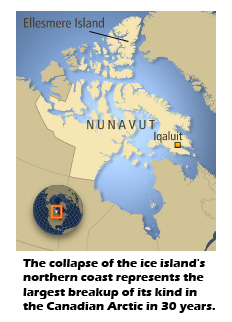Environment Minister responds to critics
 Gatineau, Quebec (GLOBE-Net) - Environment Minister John Baird Took the unusual step of reassuring Canadians that funding will be provided to priority environmental programs and services provided by the environment department. He was responding to recent criticism by a variety of non-governmental organizations over pending cuts to government’s plans to cut funding to wildlife monitoring programs and shifting monies to climate change initiatives.
Gatineau, Quebec (GLOBE-Net) - Environment Minister John Baird Took the unusual step of reassuring Canadians that funding will be provided to priority environmental programs and services provided by the environment department. He was responding to recent criticism by a variety of non-governmental organizations over pending cuts to government’s plans to cut funding to wildlife monitoring programs and shifting monies to climate change initiatives.
“Like all Canadians, I care deeply about the state of our environment and this country’s ability to monitor, manage and protect our precious natural resources” the Minister said in a News Release. He added: “In recent days there have been a number of stories written about financial pressures within my department. I want to assure all Canadians that priority programs related to all areas of the environment are maintained,” the Minister said.
He added, “I have instructed my department to provide the financial flexibility required to programs and services in critical areas, such as the Canadian Wildlife Service and the Meteorological Service of Canada so that they are maintained, and that there are no layoffs of indeterminate staff.”
Attributing part of the current financial pressure faced by his department on decisions of the previous government and former Environment Minister Stéphane Dion in 2005, Mr. Baird stated the current federal government has invested $375 million in funding for conservation programs, which is the largest investment in conservation ever.
“Canadians should make no mistake that this Government does what it says. The environment is critical to all of us and so is the financial stability of Environment Canada,” the Minister stated.
The assertions come during a period when the federal government has a great deal to celebrate. This past week countries attending the Montreal Protocol conference in Montreal reached a major agreement to speed up the phase-out of chemicals that harm the ozone layer and which contribute to climate change.
At the start of last week’s conference Minister Baird challenged the international community to speed up the phase-out of chemicals that deplete the ozone layer. His challenge was successful and such an agreement was reached.
Under the new agreement, 191 countries will aggressively accelerate the elimination of the last ozone depleting substances of importance, called hydrochlorofluorocarbons (HCFCs).
This will be accomplished by advancing the freeze of HCFCs production and consumption by 3 years in developing countries. That will be followed by the addition of an ambitious series of reductions leading to a phase out 10 years sooner.
The government also announced plans to cut water pollution by setting hard and tough new national standards for sewage treatment that will bring Canada in line with some of the toughest rules in the world today, like those in the European Union.
The proposed regulations, to be published next year, will have a positive impact on filtering out substances like phosphates, which can lead to excessive blue-green algae production, as well as mercury and pharmaceutical products in sewage outflow. The rules will enforce national standards to the more than 4,600 wastewater collection and treatment systems in towns, cities, and communities across Canada.
Perhaps the most significant public statement made this week on Canada’s environmental priorities was that made by Prime Minister Stephen Harper when he addressed the opening session on the United Nations Secretary-General’s High-Level Event on Climate Change. The Prime Minister, speaking before world leaders at the session on technology, noted that Canada had a responsibility to find cleaner and more efficient ways to convert hydrocarbons into energy and to develop technologies that would reduce greenhouse gas Emissions.
“We are also increasing Canada’s supply of renewable energy by investing in energy sources like wind, biomass, low impact hydroelectricity, geothermics, solar photovoltaics and ocean tides,” said the Prime Minister, adding that the development of clean, alternative energy sources is not solely the responsibility of governments and taxpayers.
He referenced the recently created clean technology fund which is part of a new regulatory framework that sets mandatory emission reduction targets for our major industries for the first time ever. The Fund will be used primarily to finance investments in technology and infrastructure that are highly likely to result in substantial, near-term emission reductions.
The core principle of Canada’s approach to climate change is balance, noted the Prime Minister: balancing environmental protection with economic growth; balancing public and private sector involvement in clean energy technology development; and promoting a balanced international approach to emissions reduction that engages all major emitters while respecting the unique characteristics of their economies.
To that end, the Prime Minister later told reporters at the United Nations that Canada has been invited to join the Asia-Pacific Partnership on Clean Development and Climate, which also includes Australia, Japan and South Korea.
Canada will use the Asia-Pacific partnership to try to bring the United States, China, India and other big greenhouse gas emitters into an eventual agreement on climate change, he noted.
The Prime Minister’s address at the United Nations is available here.
For More Information: Environment Canada
You can return to the main Market News page, or press the Back button on your browser.

